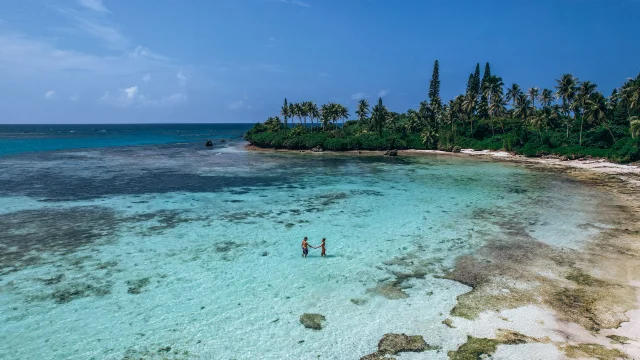 Wadra Bay beach, in Lifou
Wadra Bay beach, in Lifou Wadra Bay beach, in Lifou
Wadra Bay beach, in Lifou Wadra Bay beach, in Lifou
Wadra Bay beach, in LifouBefore you lock anything in, a few quick checks will help you avoid surprises and choose the best time to travel.
Budgeting is an important step when planning your New Caledonia holiday. Overall costs will mainly depend on international flights, accommodation, transport and activities.
Below is an indicative daily budget guide per person, based on different travel styles.
| Type of traveller | Accommodation | Food | Transport & Activities | Daily Budget |
|---|---|---|---|---|
| Backpacker | Hostels, simple guesthouses | Local eateries, snack bars | Buses/shuttles. Free or low-cost experiences. | 107–147 AUD (8 000–11 000 XPF) |
| Comfort | 2–3★ hotels, comfortable guesthouses | Casual restaurants | Car hire, selected tours | 227–333 AUD (17 000–25 000 XPF) |
| Haut de gamme | 4–5★ hotels, boutique lodges | Fine dining | Private tours, private transfers | ≥ 453 AUD (≥ 34 000 XPF) |
Budgets are indicative only and vary depending on season, availability and how far in advance you book.
Also factor in:
New Caledonia offers a wide range of experiences and accommodation styles, making it easy to tailor your trip to suit your budget:
Getting to New Caledonia is straightforward, with direct flights to Nouméa – La Tontouta International Airport from Australia, New Zealand, Singapore, Thailand and selected Pacific islands.
| Departure city | Airline(s) | Frequency | Estimated flight time | Book |
| Auckland (New Zealand) | Aircalin / Air New Zealand | Near-daily flights | ~2h 35m | Aircalin Air New Zealand |
| Bangkok (Thailand) | Aircalin | 2 to 4 flights / week | ~9h 50m | Aircalin |
| Brisbane (Australia) | Aircalin / Qantas | Near-daily flights | ~2h 35m | Aircalin Qantas |
| Singapore | Aircalin | 3 flights / week | ~9h 00m | Aircalin |
| Sydney (Australia) | Aircalin / Qantas | Near-daily flights | ~3h 15m | Aircalin Qantas |
Please note: flight schedules and frequencies may vary seasonally or due to operational conditions, so it’s best to check directly with the airline when booking.
You’ll arrive at Nouméa – La Tontouta International Airport, the main gateway to the archipelago, located around 40 minutes from Nouméa. Here’s what to know to start your holiday smoothly.
From the airport, you have several options:
Biosecurity and customs regulations apply on arrival, similar to those in Australia and New Zealand.
Make your New Caledonia holiday a true adventure, from UNESCO-listed lagoons and wide-open plains to spectacular mountain ranges and living traditions — a unique journey in the heart of the Pacific.
Prefer to explore at your own pace?
Discover itineraries designed around different travel styles, including Adventure, Family, Gourmet, Luxury, Diving, Zen and more.
New Caledonia offers a wide range of accommodation options — from simple and welcoming to boutique and luxurious.
Between lagoon, nature and culture, enjoy the experiences that make New Caledonia so special — from iconic highlights to off-the-beaten-path discoveries.
To make the most of New Caledonia, it’s worth planning how you’ll get around. The archipelago is spread out, and transport options vary between Grande Terre, Nouméa and the islands.